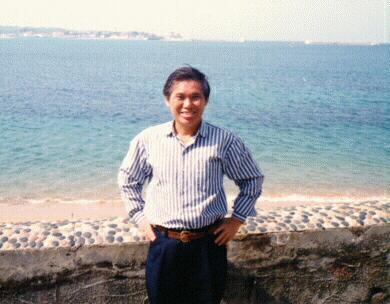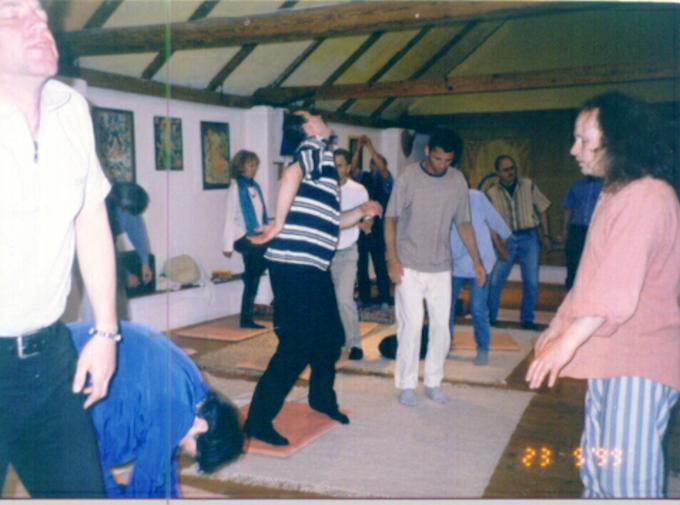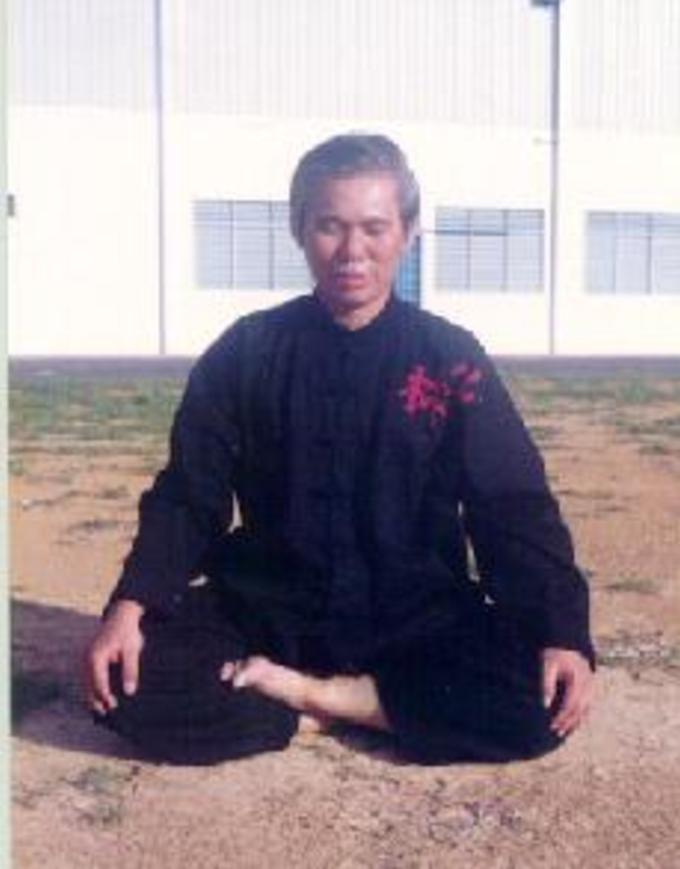SELECTION OF QUESTIONS AND ANSWERS
FEBRUARY 1998
This is the fourth issue of the Question-Answer Series

Sifu Wong at the Mediterranean beach in Spain
Question 1
A lot of chi kung movements described as beneficial to martial arts seem to emphasize channeling energy to the hand or elbow to increase the power of hand techniques while ignoring foot techniques. Why is that?
— Dudley, England
Answer
There are also a lot of chi kung exercises channelling and consolidating energy to the legs. Leg-stretching and stance training are two common examples.
In my school, the Bear Walk, Dancing Crane and Deep Knee Bending channel chi to the legs. The Golden Bridge and the Cosmos Stance consolidate energy there as well as elsewhere.
Question 2
Do you know if having certain parts of the body pierced (with decorative body jewellery) such as the center of the tongue, the skin above the hui yin, or the head of the penis will affect the circulation of chi to those areas?
Answer
I am not sure of the answer, but personally I discourage such piercing.
Question 3
During intercourse, when a woman has an orgasm a man may take in energy through his penis from the woman. Is he receiving essence or chi from her? Is there any standard way to compare the energy a man gains from a woman this way versus the amount he loses during ejaculation?
Answer
The free exchange of energy between the man and the woman is natural and contributes to the well being of both persons, unless one or both are sick.
There is no standard way of comparison, but a rough guide is that while a woman gains more energy in a normal intercourse, the man gains when he uses special techniques, like those described in some Taoist chi kung, to draw energy from the woman.
From the Shaolin perspective, which is Buddhist, such an action is unethical, as it drains a woman of her essence. Buddhist teaching forbids wittingly building one's well-being upon another's suffering.
Question 4
— Laurie and Steve, Australia
Answer
I am usually addressed as Sifu Wong, which is a short form for Sifu Wong Kiew Kit. "Sifu" means Master. Wong is my surname, and Kiew Kit is my personal name.
In Chinese culture, the surname precedes the personal name; hence Kiew Kit Wong is not correct, neither is Sifu Kit, although many Chinese in the West do place their personal names before their surnames as in Western culture.
Question 5
In your book you wrote that too much chi kung is also not good. How much is too much? I practice Chi Kung twice a day; in the morning about 15 min and in the evening about 30 min but it depends on how long my "self-manifested movements" last. Is this too much, Sifu? Sometimes I feel like I have a flu and pain all over my body.
— Lanny, Holland
Answer
A good guideline is that you should feel fresh and energized after your practice. If you feel tired, it is a clear sign that you have practised too much.
Between 15 to 30 minutes is suitable for most people on most occasions. But sometimes, depending on various factors, 15 minutes may be too much, whereas 30 minutes may not be enough. Use the guideline I mention above.
Sometimes when your chi is cleansing your rubbish out, you may feel uncomfortable. But this will soon disappear. Let your chi movements move spontaneously, unless they become too vigorous, in which case you can slow down by giving a mental instruction. Different persons, because of different needs and conditions, react differently.

Self-manifested chi movement is a very useful form of chi kung
Question 6
How do I stop my self-manifested movements when I'm tired but the movements will not stop yet? It happened to me one night. I was too tired to go on but my body still made vigorous movements and would not stop.
I had thought of my tantien and my feet. At last I managed to stop the movements. Then I sat down. While I was sitting I suddenly felt unwell and my head started circulating again.
A voice in me (I guess) told me to stand up. So I stood up and the movements began very vigorously again. After about 30 min it stopped at last. After that I felt very light and very happy (I wish I can always feel the same).
Answer
Just ask your movements to stop. It may be amazing to the uninitiated, but it is that simple if you are initiated and know how to go into the chi kung state of mind. This is one big advantage of learning from a master personally.
Your experience is a good example of what I mentioned about chi doing its best for you if you let it flow wherever it wants after you have generated its spontaneous movement. You stopped the movement with your mind power, but later when you let go, it started moving again for your benefit.
Question 7
After practising chi kung for about 2 months I feel my intuition is going to be stronger. Very often my intuition tells me something but I don't want to believe and I keep telling my self that this is just an illusion. This makes me very confused too!
Answer
There is no need to be confused. Have an open mind and let events prove whether you have acquired better intuition or are just having illusions. But remember, as you have done, some "heaven secrets" have to be kept secrets. You may do others and yourself harm by letting "heaven secrets" out.
If you are in doubt whether to keep the secrets or tell somebody as it would help him or her, sincerely ask God. If you ask your guidance spirit, the guidance spirit must be of a very high spiritual level, such as a Bodhisattva. If the guidance spirit is at your level, or sometimes even lower than your level, obviously asking him or her may not be very helpful.
Question 8
Kian keeps asking himself, "Am I doing the right thing?". This happened to him while he was practising chi kung. He saw his upper and lower body split up. While he was standing and practising chi kung he saw his lower body not in one line with his upper body.
— Matt, USA
Answer
This was a spiritual experience, and is not uncommon when we practise real chi kung, not just some gentle exercises that claim to be chi kung. Kian experienced that he is more than his physical body.
A good way to tell whether he is doing the right thing is to evaluate whether he is getting what the art is supposed to give. Many people practise chi kung and taijiquan and feel nice, but they are not doing the right thing because despite feeling nice, they never get the benefits that these arts are purported to give, such as enjoying harmonious energy flow and internal force.
Question 9
Very often when he is practising chi kung he feels cold. He feels like a ghost is standing near him and that's frightening him. So he keeps asking himself is this just an imagination? Or can you get this too when you're practising chi kung?
Answer
If he feels cold (actually refreshed) but do not feel uncomfortable, that is alright. But if he shivers and is uncomfortable, that is not correct. In this case he should stop the practice, rest for a while, then practice "Lifting the Sky" or "Self-Manifested Chi Movement" for a short time.
When one improves his senses, he or she may be able to see spirits, but they are nothing to be afraid of. When your chi is powerful, ghosts and lower spirits cannot harm you; your chi is like electricity to them.
If you meet ghosts, you should actually pity them because they are lost. You can help them by reciting some scriptures of your religion. For example, Christians can tell them some teachings from the Bible. In Buddhist teaching, if you recite the Amitabha Sutra or the Kshitigarbha Bodhisattva Sutra, or part of the sutras, you can help the ghosts. However, what Kian felt might just be his own imagination. But he should not promise anything to the ghosts.
Question 10
I want to learn more about Zen and Chi Kung and I'm wondering if you could direct me in some sort of direction.
— Kithrah, Canada
Answer
Zen is the highest of the Shaolin teaching which includes kungfu and chi kung. One can start Zen straight-away, but, in my opinion, that may not be time-effective; he may, for example, get little benefits even though he has spent a lot of time in its training. One should be physically, emotionally and mentally healthy and fit before he embarks on Zen seriously.
Nevertheless, if you are not ready to train Zen seriously yet (not many people are ready), you can approach it leisurely and still gets much benefit. One simple and effective way is to be aware of what you are doing at the moment. This appears simplistic but you would be surprised how much this practice can enrich your life.
It is also worthwhile to note that the onus of Zen is doing, not merely gathering knowledge. If you can do whatever you are doing in the most simple, direct and effective way, you would have accomplish more in Zen than reading a hundred Zen books.
Chi kung is the art of energy, particularly for promoting health, vitality, mental freshness and spiritual joy irrespective of religion. It is much more than merely doing some gentle exercise or breathing, as many people imagine.
Question 11
I am currently suffering from several health problems caused by what I think was wrong chi kung practice.
— Asman, Malaysia
Answer
You are right in saying that your health problems were caused by wrong chi kung practice. Your problems were the result of what is known in chi kung terminology as "shattering of mind leading to disorderly energy flow".
The shattering was caused by loss of mental control due to mental disturbance, added by fear and anxiety. Some energy is trapped within pockets of blockages. Sometimes the trapped energy flows within the confines of the blocked pockets, causing uncontrollable physical movement. The mind has not recovered completely from its initial shock, and therefore exists in states of fear and nervousness.
The therapeutic approach is to attack the problems at their roots, and this consists of opening the blockages to release the trapped energy, as well as calming and focussing the mind. These can be done by you yourself practising appropriate remedial exercises, or by a master opening the blockages and calming the mind, or by the combined effort of both.

Sifu Wong in Zen meditation
Question 12
I learnt for 3 years Wuzuquan and wasted it as it was brute force type. Last year, I learnt Chen style Taichichuan in Australia. I don't know if I should continue in Wuzuquan or Chen style.
My main problem is piancha (headache, nosebleed, cold in the right side of body but warm in left side, insomnia) regardless of whether it's zhan zhuang, short form Tai Chi, or Wuzuquan done slowly. Acupuncture stops piancha only for a few days. Any help is greatly appreciated.
— Benjamin, Malaysia
Answer
Wuzuquan is a style of Southern Shaolin Kungfu. In my opinion, Chen Style Taijiquan is the best choice of the various taijiquan styles.
Your "piancha" (or deviated training causing harmful side effects) is because of energy blockage, probably due to incorrect exertion of strength in your training, and possibly affecting your lung and heart meridians.
Your description of your symptoms suggests that the "piancha" is serious; although it is not life-threatening, it affects not only your present performance in your daily work as well as kungfu training, it also indirectly affects the potential life-span of related organs.
You should cure this problem before continuing with serious kungfu training. While proper training in internal kungfu like Wuzuquan and Taijiquan can eventually overcome the problem (but this will take a longer time than directly treating the problem first), it may aggravate the situation if done incorrectly. You should therefore check with your master if you decide to continue with Wuzuquan or Chen Style Taijiquan.
Question 13
I originally wrote the poem because I was trying to explain something I had experienced. It happened long ago, and I am still not sure that I understand.
— Mary, USA
Answer
You may not have fully comprehended its deeper meaning, or directly experienced the happening where emptiness is full, nothing is everything, but what you have described touches on the highest of all spiritual fulfilment.
When your teacher said "Before anything ever was, God is", he (or she) was stating a great cosmic truth although he probably did not realize its actual, deeper meaning. God here is omnipresent and eternal, everything there is -- not the anthropomorphic, father-like God you leant in Bible classes. The anthropomorphic God, whom most people know, is God the Father; the omnipresent, eternal God is God the Holy Spirit.
God the Father is not omnipresent; what is outside His form is not God. Satan, for example, is not God; neither are you and other people. God the Holy Spirit is omnipresent; It (the old Bible, I think, actually used the term "It" and not "He") is found in the minute atom and the infinite galaxies. There is nothing where God is not found. Some people may find it ridiculous or heretical, but Satan, as well as you and other people and everything there is, are all integral parts of God, otherwise God is not omnipresent.
If you examine the highest teachings of all great religious and spiritual teachers, you will find that they say the same thing, albeit in different words. In Buddhism, this ultimate reality is called the eternal Buddha (not the Buddha in the physical body of Guatama Buddha, just like not God the Son in the physical body of Jesus Christ); in Taoism it is called the Tao or the Great Void.
You have learnt about the Great Void in your past lives. You will be glad to know that the concept of reincarnation and past lives is found in Christianity, although the Church later ruled against this concept. There are actually many examples of reincarnation mentioned in the Bible.
Hearing your teacher mentioning that God is, before everything was, triggered off the innate wisdom in you. But you were confused and afraid, instead of elated and fulfilled which you actually should be had you been appropriately prepared, because this great cosmic truth occurred to you in the body and mind of a seven-year old.
